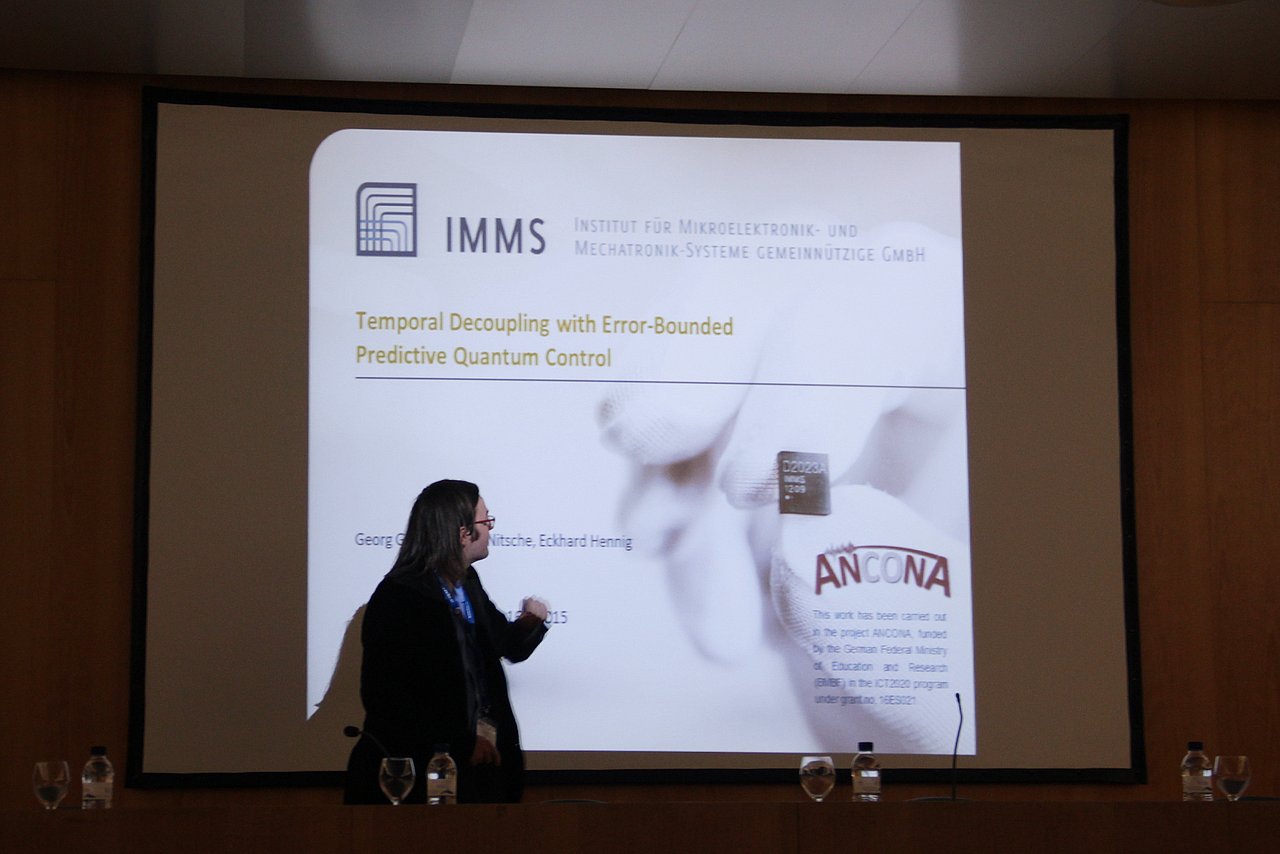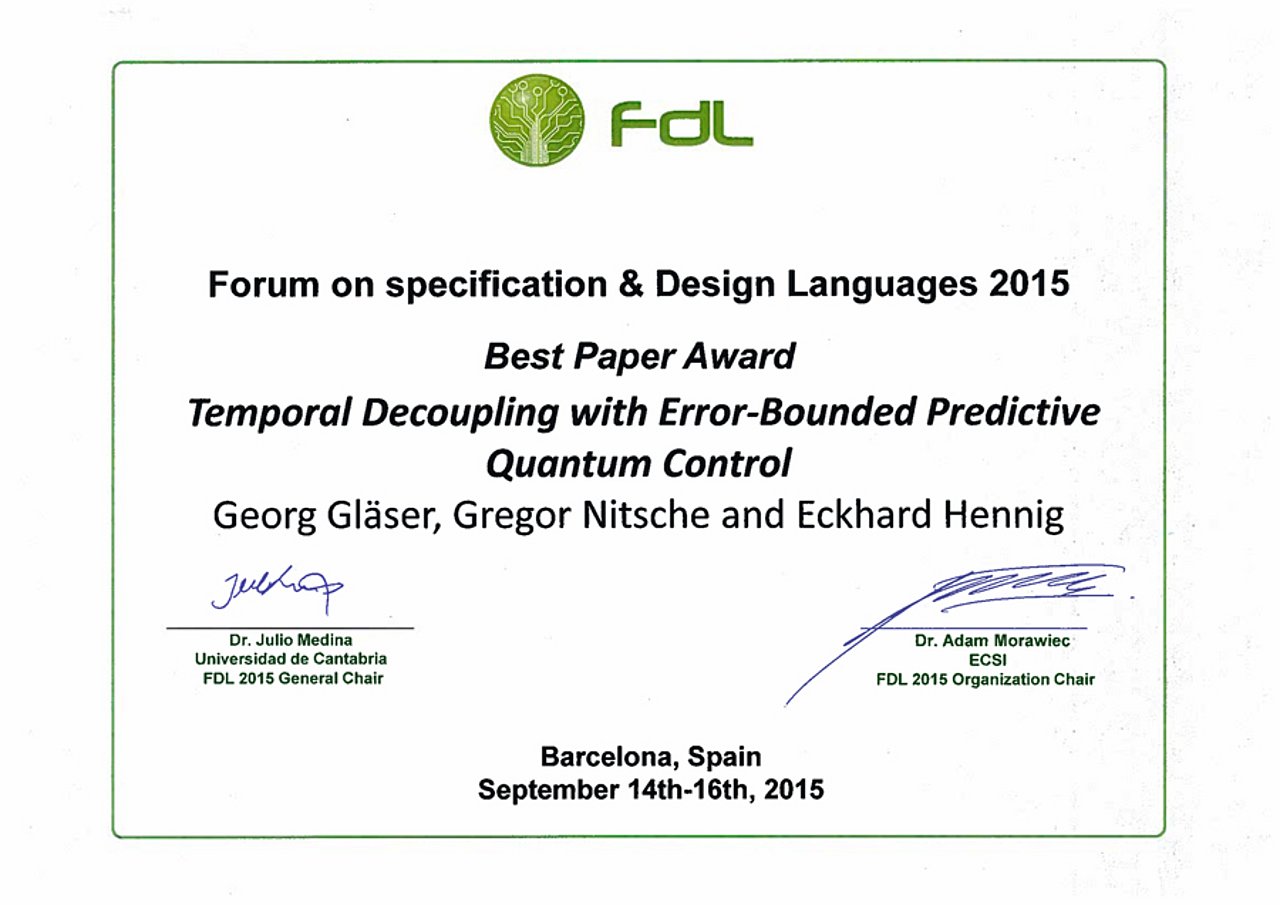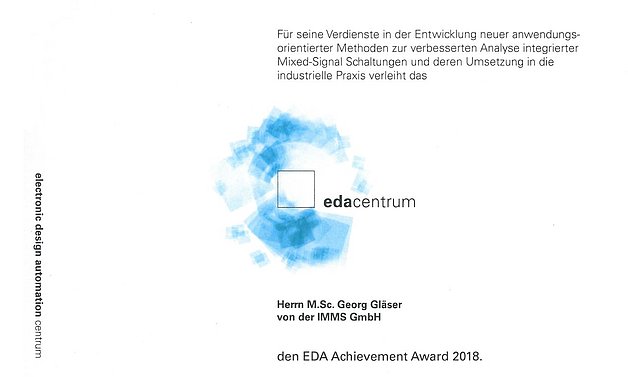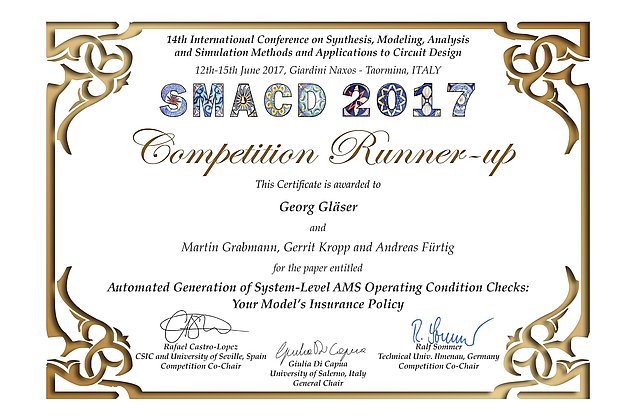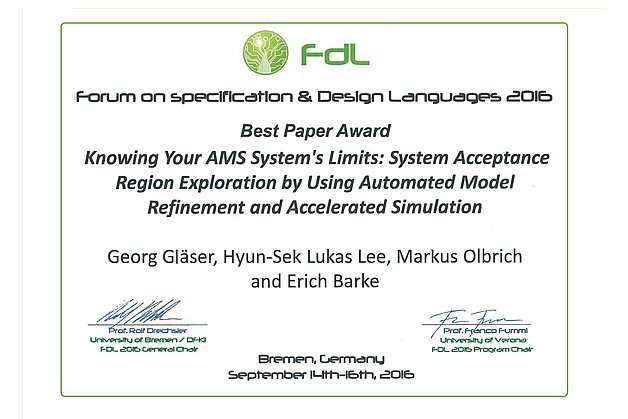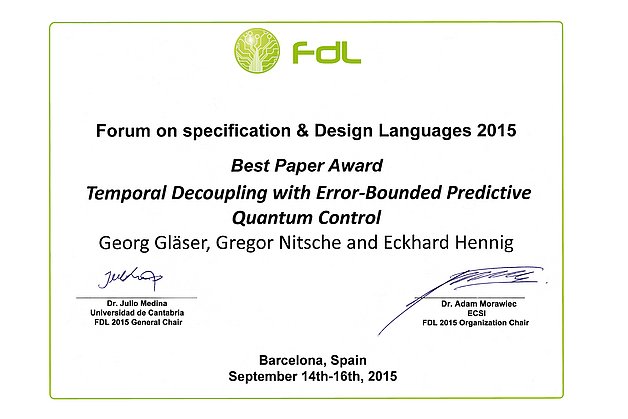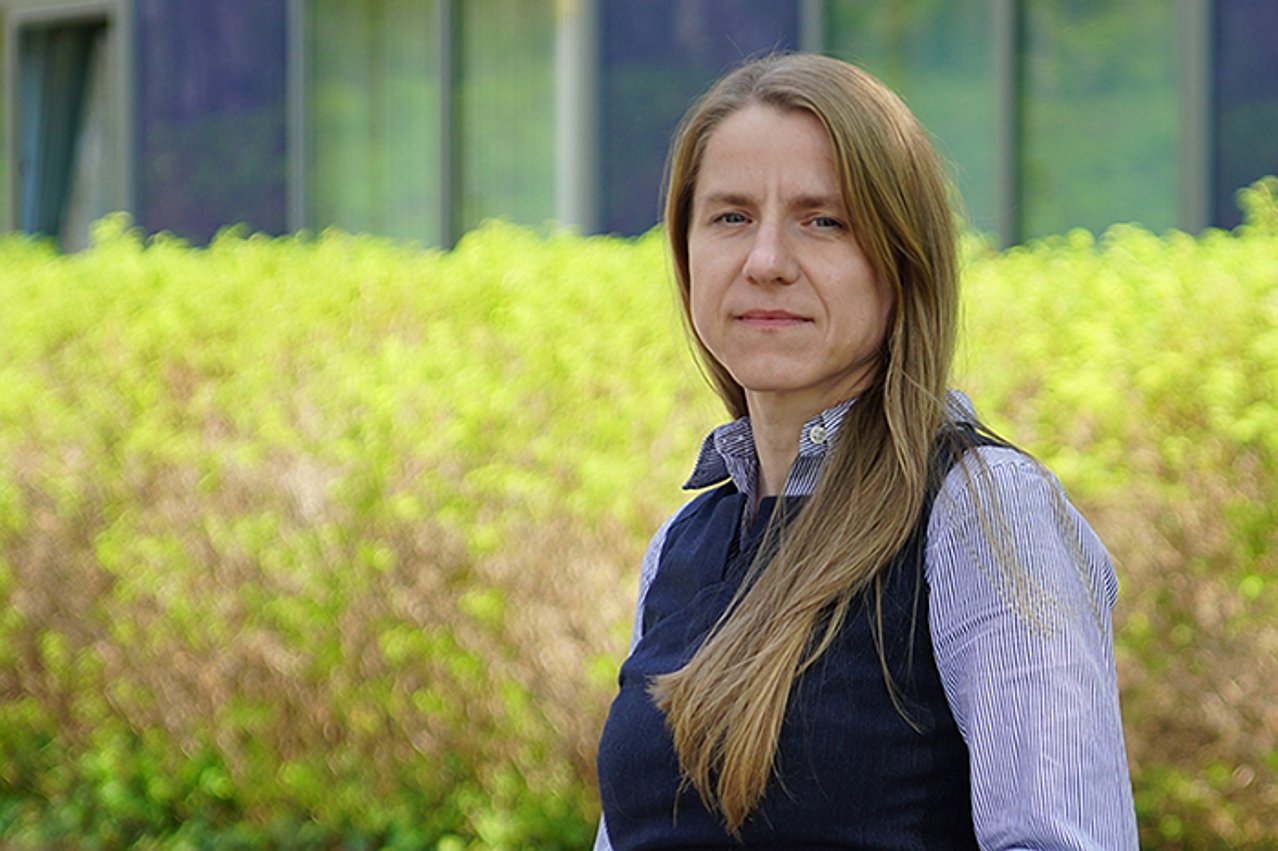Press releases
IMMS receives Best Paper Award for work on computer-aided verification methods
Novel approach to accelerate the development of Industry 4.0 applications
At the ”Forum on specification & Design Languages“ in Barcelona (Spain) on September 16th 2015 IMMS Institut für Mikroelektronik- und Mechatronik-Systeme gemeinnützige GmbH and research partners received the Best Paper Award for their contribution „Temporal Decoupling with Error-Bounded Predictive Quantum Control“.
The honoured work is an outcome of the cluster research project ANCONA which started in July 2014 and which ties with special aspects of previous research projects such as GreenSense. The ANCONA cluster includes five universities or research establishments. Computer-aided verification methods are the research subject, with the intention of improving and greatly accelerate the design of analog/mixed signal circuits, which will be the technological basis for the realisation of such visions as the Internet of Things and Industry 4.0. To date, it has largely been impossible to test the interaction between the system components and any of the parasitic currents to which they may be exposed from the mains voltage in any setting but a laboratory. Because of this, the project partners are working on computer-aided procedures which will provide reliable testing of complex systems even at the design stage and prove their functionality.
The development task of IMMS is to focus on specialised methods which will enable parasitic coupling instances to be integrated into the system models, and the models efficiently simulated.
Abstract of the honoured work
Georg Gläser1, Gregor Nitsche2, Eckhard Hennig3: Temporal Decoupling with Error-Bounded Predictive Quantum Control. 1 IMMS Institut für Mikroelektronik- und Mechatronik-Systeme gemeinnützige GmbH; 2 OFFIS – Institut für Informatik Oldenburg; 3 Hochschule Reutlingen
Virtual prototyping of integrated mixed-signal smart-sensor systems requires high-performance co-simulation of analog frontend circuitry with complex digital controller hardware and embedded real-time software. We use SystemC/TLM 2.0 in combination with a cycle-count accurate temporal decoupling approach to simulate digital components and firmware code execution at high speed while preserving clock cycle accuracy and, thus, real-time behavior at time quantum boundaries. Optimal time quanta ensuring real-time capability can be calculated and set automatically during simulation if the simulation engine has access to exact timing information about upcoming communication events. These methods fail in case of non-deterministic, asynchronous events resulting in a possibly invalid simulation result. In this paper, we propose an extension of this method to the case of asynchronous events generated by blackbox sources from which a-priori event timing information is not available, such as coupled analog simulators or hardware in the loop. Additional event processing latency and/or rollback effort caused by temporal decoupling is minimized by calculating optimal time quanta dynamically in a SystemC model using a linear prediction scheme. For an example smart-sensor system model, we show that quasi-periodic events that trigger activities in temporally decoupled processes are handled accurately after the predictor has settled.
Related content
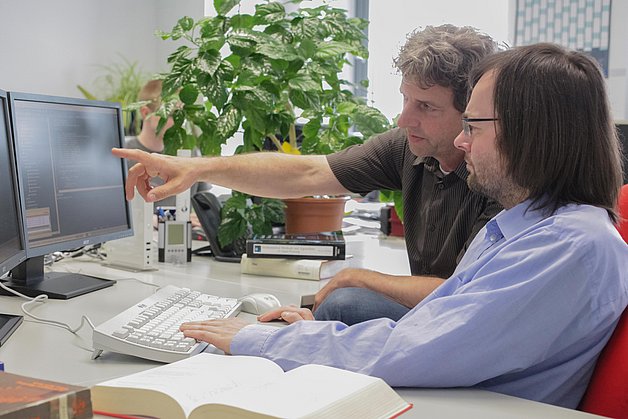
Project
ANCONA
Computer-aided verification methods have been developed to accelerate the design of Industry 4.0 applications.
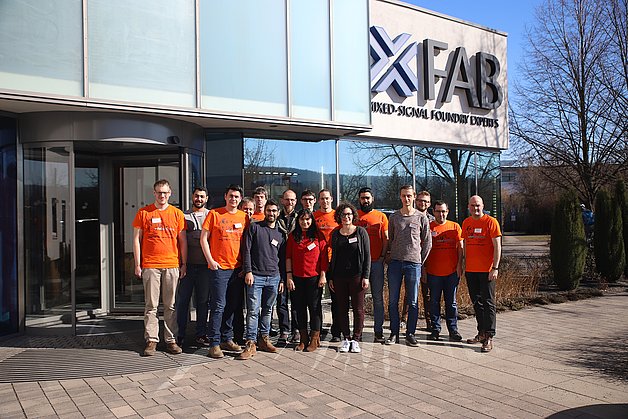
Event,
edaBarCamp -- may the 4th be with you!
Originating from our PhD meetings in a german research project, we gained the idea of starting an open research meeting based on the barcamp-concept.
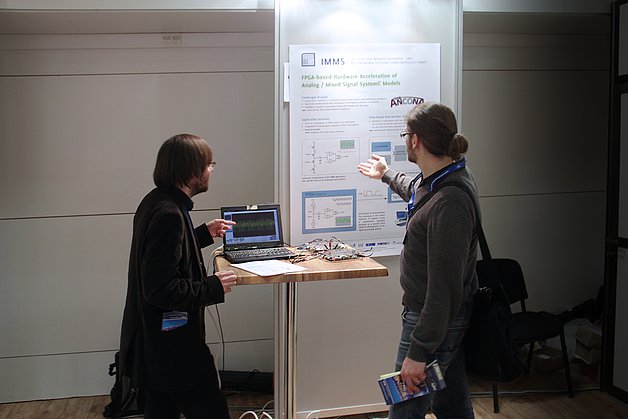
Event,
FDL 2018
Lecture at the conference ”Forum on specification & Design Languages“:
Session 1, Event-driven Modeling and Simulation, Monday 10, September 2018,…

Event,
SMACD 2018
Lecture at the 15th International Conference on Synthesis, Modeling, Analysis and Simulation Methods and Applications to Circuit Design
Contact
Contact
Dipl.-Hdl. Dipl.-Des. Beate Hövelmans
Head of Corporate Communications
beate.hoevelmans(at)imms.de+49 (0) 3677 874 93 13
Beate Hövelmans is responsible for the text and image editorial work on this website, for the social media presence of IMMS on LinkedIn and YouTube, the annual reports, for press and media relations with regional and specialist media and other communication formats. She provides texts, photographs and video material for your reporting on IMMS, arranges contacts for interviews and is the contact person for events.


